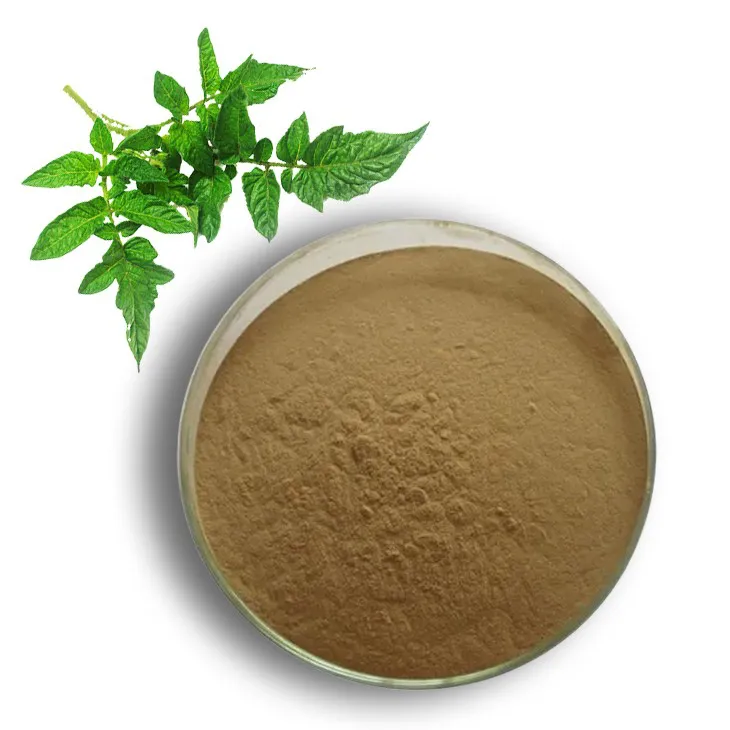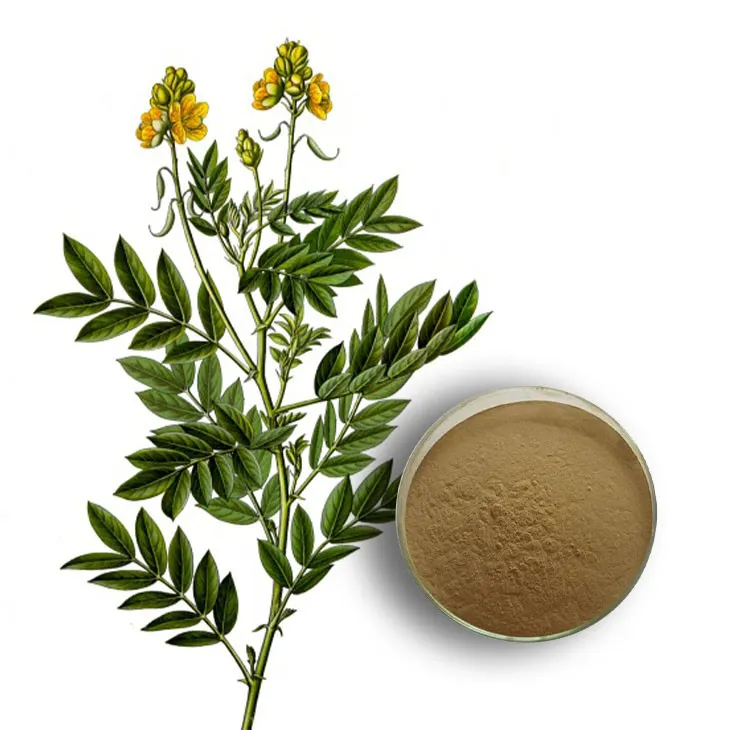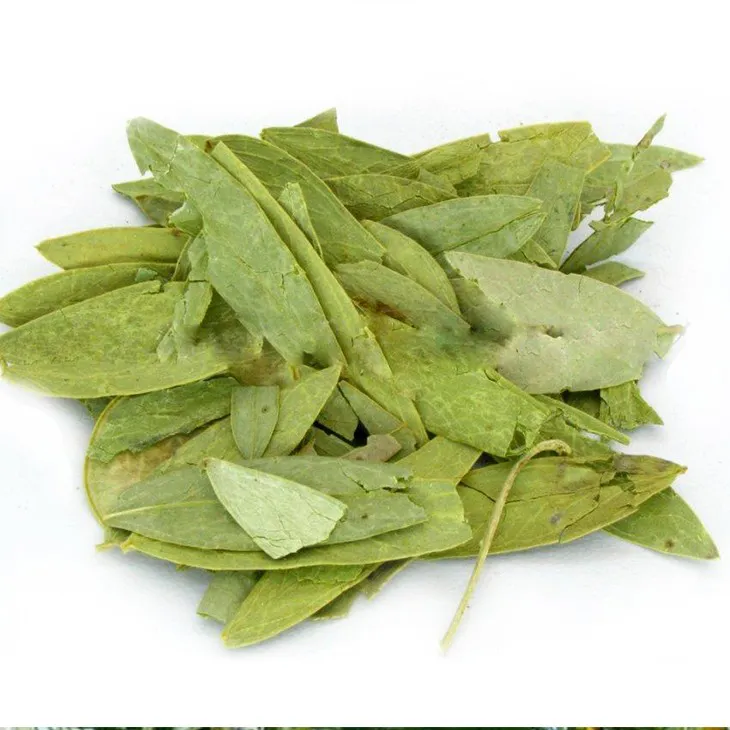- 0086-571-85302990
- sales@greenskybio.com
Senna leaf extract can reduce hypertension.
2024-11-12

1. Introduction
Hypertension, also known as high blood pressure, is a major global health concern. It is a chronic condition that significantly increases the risk of heart disease, stroke, and other serious health problems. The search for effective and natural ways to manage hypertension has led to the exploration of various plant - based extracts. Senna Leaf Extract has recently come into the spotlight as a potential agent for reducing hypertension.

2. Understanding Hypertension
Blood pressure is the force exerted by the blood against the walls of the arteries. Hypertension is defined as a persistent elevation of blood pressure above normal levels. There are multiple factors that contribute to the development of hypertension, including lifestyle factors such as diet, physical inactivity, and excessive alcohol consumption, as well as genetic factors.
2.1. The Role of Hormones in Hypertension
Hormones play a crucial role in regulating blood pressure. For example, the renin - angiotensin - aldosterone system (RAAS) is a major hormonal system involved in blood pressure control. Renin is an enzyme that is released when blood pressure drops, which then converts angiotensinogen to angiotensin I. Angiotensin - converting enzyme (ACE) further converts angiotensin I to angiotensin II, a potent vasoconstrictor that also stimulates the release of aldosterone. Aldosterone promotes sodium and water retention, increasing blood volume and ultimately blood pressure.
2.2. Blood Vessel Health and Hypertension
The health of blood vessels is also essential in maintaining normal blood pressure. Endothelial cells lining the blood vessels play a key role in regulating vascular tone. Dysfunction of these cells can lead to increased vasoconstriction and decreased vasodilation, contributing to hypertension. Oxidative stress, which is an imbalance between the production of reactive oxygen species (ROS) and the body's antioxidant defenses, can damage endothelial cells and is associated with the development of hypertension.

3. Senna Leaf Extract: General Overview
Senna is a plant that has been used in traditional medicine for various purposes. The extract of senna leaves contains a variety of bioactive compounds, including flavonoids, sennosides, and tannins. These compounds are thought to be responsible for the potential health benefits of Senna Leaf Extract.
3.1. Chemical Composition of Senna Leaf Extract
The main active components in senna leaf extract are sennosides, which are anthraquinone glycosides. Sennosides have laxative properties, but recent research has also focused on their potential role in blood pressure regulation. Flavonoids, such as rutin and Quercetin, are also present in senna leaf extract. These flavonoids have antioxidant, anti - inflammatory, and vasodilatory properties, which may contribute to its effects on hypertension.
3.2. Traditional Use of Senna
Traditionally, senna has been used mainly for its laxative effects to relieve constipation. However, in some traditional medicine systems, it has also been used for other conditions, such as liver disorders and skin diseases. The use of senna for hypertension is a relatively new area of research, building on the known biological activities of its components.

4. How Senna Leaf Extract May Affect Hypertension
There are several mechanisms by which senna leaf extract may act on hypertension.
4.1. Effects on Blood Pressure - Related Hormones
Senna leaf extract may influence the RAAS. Some studies suggest that the flavonoids in senna leaf extract can inhibit the activity of ACE, thereby reducing the conversion of angiotensin I to angiotensin II. This would lead to decreased vasoconstriction and ultimately lower blood pressure. Additionally, by modulating the release or activity of aldosterone, senna leaf extract may also affect sodium and water balance, further contributing to blood pressure regulation.
4.2. Antioxidant Properties and Blood Vessel Health
The antioxidant properties of senna leaf extract, mainly due to its flavonoid content, can help protect blood vessels from oxidative stress. By reducing oxidative damage to endothelial cells, senna leaf extract may improve endothelial function. This can result in enhanced vasodilation and better blood flow, which is beneficial for reducing blood pressure. The flavonoids in the extract can scavenge ROS, neutralize free radicals, and upregulate antioxidant enzymes in the body.
4.3. Other Potential Mechanisms
Senna leaf extract may also have anti - inflammatory effects. Chronic inflammation is associated with hypertension, and by reducing inflammation, the extract may help lower blood pressure. Additionally, it may interact with other signaling pathways involved in blood pressure regulation, such as the nitric oxide (NO) pathway. NO is a vasodilator, and promoting its production or activity can lead to decreased blood pressure.
5. Evidence from Research Trials
Several research trials have been conducted to investigate the effects of senna leaf extract on hypertension.
5.1. Animal Studies
In animal models of hypertension, such as spontaneously hypertensive rats (SHR), senna leaf extract has shown promising results. For example, one study found that administration of senna leaf extract for a certain period led to a significant decrease in blood pressure in SHR. The extract was shown to affect the levels of blood pressure - related hormones and improve endothelial function in these animals. However, it is important to note that the results from animal studies may not always directly translate to humans.
5.2. Human Studies
There have been some small - scale human studies on the effects of senna leaf extract on blood pressure. In a pilot study, a group of hypertensive patients who were given senna leaf extract supplementation for a few weeks showed a slight but significant reduction in blood pressure compared to the control group. However, more large - scale, well - designed human studies are needed to confirm these findings and establish the safety and efficacy of senna leaf extract in treating hypertension.
6. Dosage and Form of Senna Leaf Extract for Hypertension
When considering the use of senna leaf extract for its potential anti - hypertensive effects, it is important to know the proper dosage and form.
6.1. Dosage
The appropriate dosage of senna leaf extract for hypertension has not been firmly established yet. In general, for its laxative effects, the recommended dosage of senna leaf extract is relatively low. However, when used for potential blood pressure - lowering effects, different dosages may be required. Some preliminary studies suggest starting with a low dose and gradually increasing it while monitoring blood pressure and any potential side effects. It is crucial to consult a healthcare professional before starting any supplementation with senna leaf extract.
6.2. Form
Senna leaf extract is available in various forms, such as capsules, tablets, and tinctures. The form may affect its absorption and bioavailability. Capsules and tablets are convenient for regular use, while tinctures may be absorbed more quickly. However, the choice of form also depends on individual preferences and any potential digestive issues. For example, some people may find capsules easier to swallow, while others may prefer tinctures for faster onset of action.
7. Safety Considerations
While senna leaf extract may have potential benefits for reducing hypertension, there are also safety considerations.
7.1. Side Effects
The most common side effect of senna leaf extract is its laxative effect, which can lead to diarrhea if taken in excessive amounts. This can cause dehydration and electrolyte imbalances, which may have implications for blood pressure control. Other potential side effects may include abdominal cramps, nausea, and vomiting. Long - term use of senna may also have effects on the colon, such as melanosis coli, a condition characterized by a darkening of the colon lining.
7.2. Interactions with Medications
Senna leaf extract may interact with certain medications. For example, it may interfere with the absorption of some drugs, especially those taken orally. It is important to inform your healthcare provider if you are taking any medications, including over - the - counter drugs, before starting senna leaf extract supplementation. This is to avoid any potential adverse drug interactions that could affect the effectiveness of medications or increase the risk of side effects.
8. Conclusion
Senna leaf extract shows potential as a natural agent for reducing hypertension through its effects on blood pressure - related hormones, antioxidant properties, and other mechanisms. However, more research, especially large - scale human trials, is needed to fully understand its efficacy and safety. The proper dosage and form need to be determined, and safety considerations, such as side effects and potential drug interactions, must be taken into account. If further research confirms its benefits, senna leaf extract could be a valuable addition to the arsenal of natural remedies for hypertension.
FAQ:
What is the mechanism by which senna leaf extract reduces hypertension?
The senna leaf extract may act on hypertension through multiple mechanisms. It can affect blood - pressure - related hormones. Its antioxidant properties are beneficial for blood vessel health, which in turn can influence blood pressure. Additionally, it has an impact on the renin - angiotensin - aldosterone system, which plays a crucial role in regulating blood pressure.
Are there any side effects when using senna leaf extract to reduce hypertension?
While senna leaf extract may have potential in reducing hypertension, it may also have side effects. Senna is a laxative, and excessive use can lead to diarrhea, abdominal cramps, and electrolyte imbalances. However, when used appropriately for its potential anti - hypertensive effects, these side effects can be minimized. More research is needed to fully understand the long - term side - effect profile.
How much senna leaf extract should be taken to effectively reduce hypertension?
The appropriate dosage of senna leaf extract for reducing hypertension is still being studied. Different research trials may suggest different dosages based on various factors such as the concentration of active ingredients in the extract, the individual's overall health status, and the severity of hypertension. It is crucial to follow the guidance of healthcare professionals when considering using senna leaf extract for this purpose.
Can senna leaf extract be used alone to treat hypertension?
Currently, it is not advisable to use senna leaf extract alone to treat hypertension. Hypertension is a complex condition that often requires a comprehensive approach including lifestyle modifications (such as diet and exercise) and may need the combination of multiple medications. While senna leaf extract shows potential, more research is needed to establish its role as a sole treatment option.
How long does it take for senna leaf extract to show its effect on reducing hypertension?
The time it takes for senna leaf extract to show its effect on reducing hypertension varies. It depends on factors such as the individual's body response, the dosage taken, and the overall health condition. Some initial changes in blood pressure - related parameters may be observed within a few weeks, but for more significant and stable effects, a longer - term study and consistent use may be required.
Related literature
- The Potential of Senna Leaf Extract in Cardiovascular Health"
- "Senna Leaf Extract: A New Hope for Hypertension Management?"
- "Antihypertensive Effects of Natural Extracts: Focus on Senna"
- ▶ Hesperidin
- ▶ Citrus Bioflavonoids
- ▶ Plant Extract
- ▶ lycopene
- ▶ Diosmin
- ▶ Grape seed extract
- ▶ Sea buckthorn Juice Powder
- ▶ Fruit Juice Powder
- ▶ Hops Extract
- ▶ Artichoke Extract
- ▶ Mushroom extract
- ▶ Astaxanthin
- ▶ Green Tea Extract
- ▶ Curcumin
- ▶ Horse Chestnut Extract
- ▶ Other Product
- ▶ Boswellia Serrata Extract
- ▶ Resveratrol
- ▶ Marigold Extract
- ▶ Grape Leaf Extract
- ▶ New Product
- ▶ Aminolevulinic acid
- ▶ Cranberry Extract
- ▶ Red Yeast Rice
- ▶ Red Wine Extract
-
Chaste Berry Extract
2024-11-12
-
Ivy Extract
2024-11-12
-
Almond Extract Powder
2024-11-12
-
Angelica sinensis extract
2024-11-12
-
Lemon Balm Extract
2024-11-12
-
Oyster Mushroom Extract Powder
2024-11-12
-
Buckthorn bark extract
2024-11-12
-
Citrus bioflavonoids
2024-11-12
-
Phyllanthus Emblica Extract
2024-11-12
-
Honeysuckle Pollen
2024-11-12





















